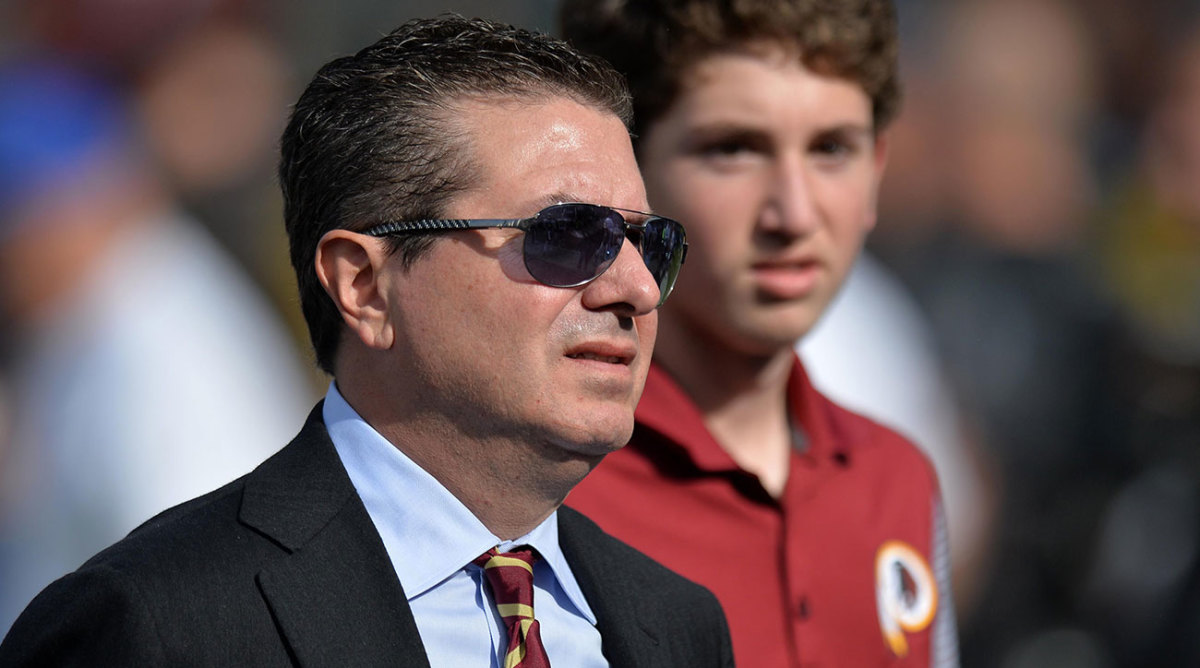Even After Agreeing to Change the Name, Dan Snyder Still Won't Admit He Was Wrong
Dan Snyder grew up cheering for Washington’s NFL team, seeing what he wanted to see and believing what he wanted to believe. “Redskins” was not a slur to him; it was who he cheered for on Sundays. This is understandable. He was a kid. Snyder’s failure came in adulthood, when he bought the team and still viewed its name like a child’s favorite toy: It’s mine, and nobody can take it from me.
Everything Snyder has done with the name has been about a fight. He didn’t listen to people who were hurt by the name. He cited flawed polls that told him what he wanted to hear. He tried to buy his way out of criticism. He caved only because of financial pressure from sponsors. Even in the end, when he announced he would change the name, he did so grudgingly, from the @Redskins Twitter account, with the offensive logo on the letterhead, in a statement that mentioned the “proud, tradition rich franchise” but not the Indigenous people who demanded the change. Dan Snyder sees what he must do, but he still won’t admit why.
The name is racist, Dan. Just admit it. Say it out loud. Say you feel bad about standing by it for so long. You might find it liberating.

Snyder was wrong, but nobody has to be wrong forever. Drew Brees was wrong when he criticized those who kneel during the national anthem, implying that his American experience should define theirs. But Brees apologized and promised to listen and help fight systemic inequality. He deserves that chance.
DeSean Jackson was wrong when he quoted Hitler in his Instagram story. He was so outrageously wrong that this hardly requires an explanation. If you support any quote from Adolf Hitler—real or fabricated—you’re heading the wrong way down a one-way street; Jackson, the Eagles receiver, also wrote on Instagram that Jews were trying to "extort America" and achieve "world domination.” It was offensive and vile. But Jackson has apologized, and he has accepted an invitation to visit Auschwitz. And you know what? That is exactly what we should want him to do.
The ongoing debate about “cancel culture,” like most of our ongoing debates, lacks the nuance of a truly thoughtful discussion. No, people should not be able to say whatever they want with impunity. Some comments are offensive and some names are racist, and they should not just linger in the air untouched forever. But it is possible to screw up, even as royally as Jackson did, and learn from it.
Jackson has worked hard, for many years, to fight bullying. If he summons the same generosity of spirit that moved him in that direction, he can learn about Jewish history and really understand the wrongness of what he did. If Jackson were a coach or general manager, I would probably push for his firing; letting a person in a position of authority espouse those views is unfair to everybody who works for him. But he is a wide receiver. Telling him he can’t catch passes for a while isn’t really going to help anybody.
There is no clear grading scale for offensive comments. Brees’s words received more attention than Jackson’s for a variety of reasons. Brees is a bigger star than Jackson. His words seemed like a white person’s dismissal of the Black Lives Matter movement, while Jackson’s seemed to come out of nowhere. There are other reasons. Reactions can vary based on level of celebrity, cultural history, previous actions and statements, timing, platform and what else is happening in the news cycle at the moment. The formula is not scientific, nor always fair.
But we can fairly say Jackson was ignorant. So was Brees. So was former NBA star Tim Hardaway, who made horribly anti-LGBTQ comments many years ago, creating a firestorm he cannot completely escape. But Hardaway did not get defensive. He listened with an open mind, and, as he said later: “What I found out is that everybody should be treated equally no matter what. … I do feel that way.” Hardaway wanted some distance from his initial comments, but he did not duck questions about them.
Dan Snyder has ducked the big question for years. In a way, he is still ducking it. It’s embarrassing to admit you stuck with a racist name for so long. But not admitting it is so much worse.
• Question or comment? Email us.
